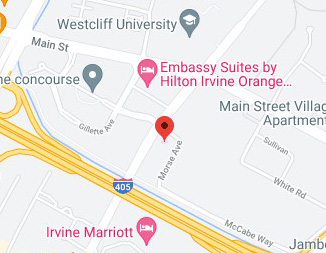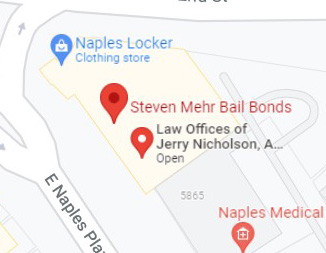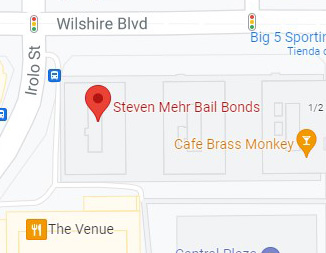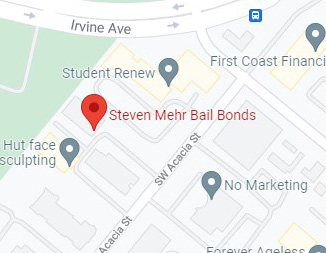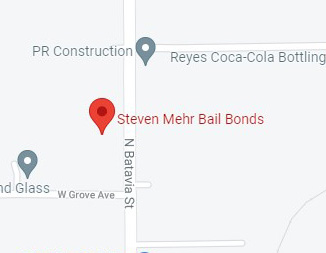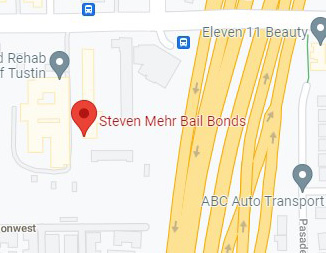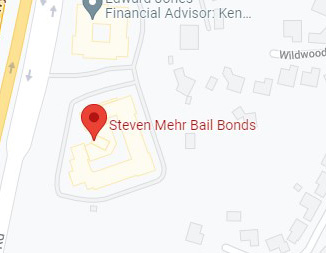Suddenly receiving news that your loved one or a close friend is in police custody can be a scary ordeal. It can become even scarier and frustrating if you’re the one behind bars for any alleged offense. Fortunately, you don’t have to deal with this predicament alone because there are ways you might be able to obtain freedom as the case continues.
At Steven Mehr Bail Bonds, we comprehend and understand what you might be feeling while staring at those bars in jail for any alleged offense. We also comprehend that you want to be home soon to better work with your attorney and prepare everything you need for the upcoming court proceedings.
To ensure that happens, we are available 24/7 to provide you with a reliable way of posting bail to secure your freedom even at night. Don’t hesitate to retain the services of a bail bond agent if you are in police custody in Laguna Woods or surrounding environs for assistance on the bail process, which is a new and unfamiliar legal issue to most defendants.
Do’s and Don’ts When Dealing With the Police
When dealing or interacting with the law enforcement officers for any alleged offense, it is vital to remember the following do’s and don’ts to stay on the safest side of the legal justice system:
Stay Calm
To find probable cause to initiate an arrest against you, police officers may act friendly with you so that you can disclose some incriminating information. When dealing with officers for an alleged offense, it is advisable to remain calm and quiet because it is part of your constitutional right.
Remaining calm and quiet is also the best way to protect your interests, even if the officers cannot stop bombarding you with their tricky and confusing questions. When they insist that you should speak, you should tell them to talk with your defense attorney.
Stay Keen to Note Your Constitutional Right Violations by the Officers
Apart from staying quiet, you have other constitutional rights that you should protect during your interaction with the police, including:
-
Right to remain free from any unlawful search whether in your person or in your vehicle
-
Right to speak to a legal representative or an attorney
-
Right to have humane treatment
Police misconduct is not an uncommon issue that could eventually make you subject to a wrongful conviction for a crime you didn’t commit. To avoid being a victim of these illegal practices by the police, you should be keen to note whether the officers have respect for your legal rights or not.
When you suspect any violation of your constitutional right during your interaction with the police, you should let your defense attorney know once you meet with him/her because police misconduct is unlawful.
Don’t Resist a Police Arrest
When a police officer tells you that you’re under arrest, you must cooperate with them. Resisting a police arrest can count as a different offense in the criminal justice system, making you subject to harsher penalties upon conviction for the underlying offense.
If you are bothered by the arrest, you can ask the arresting officers to explain the reason for your arrest. Police may also allow you to call your family member or friend to inform them of your current situation.
The Booking Procedure Following an Arrest
Typically, the booking procedure is an administrative process that occurs at the police station following an arrest. Generally, during this procedure, you should anticipate the following activities:
-
Recording of some vital information like alleged criminal charge, your name, date, and fingerprint information
-
Mugshots
-
Thorough full body search
-
Confiscation of your belongings
After this process, the officer may authorize you to head home or not, depending on the severity and sophistication of the alleged case. For severe offenses, the officer will require you to stay in jail with other offenders, pending the bail/arraignment hearing, which should occur within 48 hours after the arrest.
Understanding Bail and the Importance of Posting Bail in this Situation
You become a defendant in the criminal justice system once you are under arrest for any offense. That means your freedom will depend on the actions you will take after an arrest. One of the most crucial actions you should take after arrest for any offense is posting bail.
Bail in the legal justice system is the refundable amount of money you or a friend can pay to the court on your behalf to ensure your availability for future court appearances after securing your freedom.
The justification of posting bail is mainly to ensure your availability during the alleged offense trial. Under the law, you or your friend might be able to post the required bail on your behalf using:
-
Cash – Posting cash bail seems almost impossible to most people because most arrests happen unexpectedly. If you don’t have some money at hand, the court may allow you to use a cashier’s cheque to post cash bail
-
Property – To avoid discriminating against indigent people who cannot afford the required cash bail, the court may also give you an option to obtain your release using an asset or property. Posting your bail using a property may seem like a favorable option to obtain your freedom, but it is a risky move. It is a risky move because the court has the authority to hold on to your property or sell it when you fail to show up for the alleged case’s hearings
-
Bail bond – A bail bond is a reliable and most preferred way of posting bail because cash bail is often burdensome and unaffordable to most people. To post a bail bond, you need to contact a licensed and available bail bond agent. Continue reading this article to understand how a bail bondsman or agent can help you during this time of immediate need.
Once you are under arrest, posting bail might be the only way you might be able to secure your release from police custody. Below are the reasons why posting bail is critical following an arrest:
-
Lawmakers acknowledge that you aren’t guilty yet until the alleged case final verdict
-
You’ll have a chance to actively participate in building legal defenses to counter the alleged charge, which may help your attorney in court to achieve the best outcome
-
You will be able to unite with your family and continue with your daily activities while the alleged case is winding its way in the criminal justice system
Generally, posting bail is a worthwhile “investment” you cannot undermine after the arrest and booking process.
Guiding Steps For Securing Your Release After An Arrest
Spending a day or night in the detention hall after an arrest is a nightmare to most people, not only you. Elaborated below is a step-by-step guide for securing your deserved freedom following an arrest:
-
Know Your Bail Amount
The court will determine the ideal bail amount you should pay as bail to secure your release from the detention hall. This legal issue of determining your bail amount will occur at your first court appearance, known as the bail/arraignment hearing. When determining the ideal amount you should post as bail, the court may check the bail schedule.
Most counties here have a bail schedule that lists various common offenses that people commit and a corresponding speculative amount of bail a defendant should pay for his/her alleged offense. Further, the court will also consider the following factors before setting your bail amount:
-
Your financial capability
-
The chances of you leaving or fleeing the country after the release
-
Your criminal history
-
The risk of starting violence
-
Your alleged offense sophistication and severity
Once the court determines the ideal amount of money you should pay as bail, you should take the necessary steps to do so as soon as you can. As mentioned earlier, you have an option of posting your bail using cash, property, or bail bond.
-
Hire a Bail Bondsman or Agent
To avoid digging on the only money you have in your savings account to bail yourself out of jail, you should consider hiring a reliable bail bondsman or agent to post the bail on your behalf. Retaining the services of a bail bondsman is a wise idea since these professionals have relevant experience in this legal process.
That means you might be able to obtain your release within no time if you have an experienced and skilled bail bondsman on your side. To commence this critical bail process, you should speak with a friend or a relative to text or call a reputable bail bondsman on your behalf.
The bail bondsman will work with the court presiding over your alleged offense to secure your release before the trial. The bail bondsman will agree to pay your bail to secure your release from jail. However, you have to pay a 10 percent fee of the total required bail amount (non-refundable) and sign a contract agreeing to abide by the conditions of your release.
Since the bail bondsman will take the financial risk of your failure to show up in court, you may have to provide collateral to act as surety or security for your pre-trial release. When you decide to free after securing your freedom, the agent will keep or sell the collateral, which could be a house or a car, to recover the bond paid to the court.
Depending on the circumstances surrounding your alleged case and the jail you are detained at Laguna Woods, it may take 20 minutes to 10 hours before you step out of jail after posting a bail bond. If you are helping a friend secure a release from jail using a bail bond, you should let your prospective bail bondsman know the following to make this process seamless:
-
Your friend’s legal name
-
Your friend’s booking number
-
The jail he/she is detained
-
The alleged charges against him/her
-
Show up for Your Case’s Trial
Failing to appear in court after posting bail does not only affect your freedom but may also attract a fine and imprisonment term after re-arrest. To avoid missing the scheduled court dates, you should abide by the conditions of your release, including:
-
Remaining in your area of residence
-
Checking in with a court-assigned probation officer periodically through a phone call
-
Avoiding contact with a particular group of people who might tempt you to violate the pretrial release conditions
-
Surrendering your driving license and passport
When you fail to appear in court for your case’s trial, the bail bondsman or agent responsible for your pre-trial release will retain the services of a private detective to find you and send you to jail again. To avoid a re-arrest after obtaining your necessary freedom, you should set a reminder on your phone to remind you of your case’s hearing date and time.
If you comply with the pretrial release conditions and show up in court as required, the court will return your bail bond funds. That means the bail bondsman or agent will have no reason to hold on to your property as collateral anymore. Once you’re out of jail, you should talk with your bail bondsman or agent to help you understand the conditions and restrictions of this form of pretrial release.
The City of Laguna Woods Jail and Courthouse Information
You might need the information below when posting bail on behalf of your beloved friend or relative who is in police custody:
Jail Information
Intake/Release Center (IRC)
James A Musick Facility
Courthouse Information
Lamoreaux Justice Center
Central Justice Center
Find a Bail Bondsman Near Me
If you are looking for a flexible way to post your bail and stay free after an arrest, dependable bail bond agents at Steven Mehr Bail Bonds are here for you every day of the week. We invite you to call us at 800-834-8522 to discuss your case with our discreet agents at no cost.
We are available all around the clock to provide defendants like you with affordable and prompt bail bond services that you deserve to obtain your freedom after an arrest in Laguna Woods, California.





